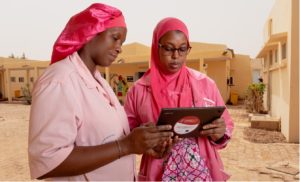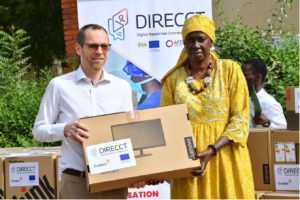Connectivity, training and digital solutions to strengthen resilience and quality of care in healthcare facilities in the regions of Fatick, Kaffrine and Kaolack
Initiated with the support of the Organisation of African, Caribbean and Pacific States (OEACP) and funding from the European Union, the DIRECCT programme – Digital Response Connecting Citizens – is jointly implemented by the Belgian Development Agency (Enabel) and the French Development Agency (AFD). Its aim is to support connectivity and the development of digital solutions in African, Caribbean and Pacific (ACP) countries in the health, education and entrepreneurship sectors in order to improve their resilience in the face of current and future shocks.
In Senegal, the implementation of the HEALTH intervention of the DIRECCT programme carried out by Enabel aims to support the Ministry of Health and Social Action (MSAS) in modernising the system for collecting and sharing health information between the central and regional levels to improve the quality of care and health decision-making. In addition, DIRECCT, in support of pillar 2 of Enabel’s bilateral portfolio in Senegal, is helping to achieve strategic objective 74 of the Senegal Numérique 2025 strategy: ‘Implementing the digital transformation of the health sector’, and the 2018-2023 Digital Health Strategic Plan of the Ministry of Health and Social Action.
BACKGROUND
The pandemic context and the crises of recent years have had an unprecedented impact on the healthcare sector. The management of the pandemic has imposed measures such as confinement, social distancing, restriction of movement and recourse to teleworking, highlighting the inequality of access to digital tools.

In Senegal, the health sector faces connectivity challenges, particularly in rural and remote areas. While more than half of people in the urban area of Dakar have access to the internet, only 15.9% of rural populations do (ANSD, 2021). In addition, the connectivity of health facilities, such as health centres and hospitals, is uneven, hampering communication and the exchange of information in real time.
In addition, although many healthcare professionals have been trained in the use of basic technologies, digital skills remain uneven. This digital skills gap can limit the adoption and effective use of digital tools to improve healthcare delivery, particularly in times of health crisis.
In this context, it has become essential to encourage the adoption of digital tools adapted to their specific needs. Aware of the importance of digital technologies, the Organisation of African, Caribbean and Pacific States (OEACP) and the European Union have set up an ambitious programme to help healthcare structures embark on a digital journey and improve their efficiency in delivering quality healthcare services to patients.
By strengthening the development of digital health, the programme aims to ensure the continuity of essential exchanges of important and sensitive data for monitoring health crisis situations in countries and enabling effective coordination at regional level.
In Senegal, this specific intervention aims, in support of the country’s progress in e-Health, to strengthen the capacity of health services located in three regions of Senegal, by improving the connectivity of selected health establishments, building the digital capacities of health sector staff and supporting the adoption of an electronic patient file and a hospital management information system in the Sine Saloum region.
ACTION
The activities implemented as part of the project with a view to stimulating improvements in the quality of care and the effective and efficient management of healthcare facilities in the target regions are as follows:
- Assessment of digital infrastructure needs
Carrying out a study and producing a decision-support report of over 400 pages, including an exhaustive diagnosis of IT and energy infrastructures, network and Internet connectivity, an assessment of processes, organisation and partnerships in 15 healthcare facilities in the Fatick, Kaffrine and Kaolack regions, as well as recommendations and proposed solutions for modernisation and improvement.
- Improving access to connectivity (supply of IT equipment)
Provision of IT equipment and materials to improve care, the collection of health information and the management of health resources on patient circuits in the beneficiary health facilities. IT equipment at the Kaolack regional hospital, 9 health centres and the 3 medical regions of Fatick, Kaffrine and Kaolack have been upgraded.
- Strengthening the digital skills of staff
Training staff from 15 health facilities in digital skills, in 12 modules, including office automation, Internet, digital hygiene, e-health basics and cybersecurity basics. The aim of this training is to turn the 521 staff members of the beneficiary health facilities into informed users of digital tools and to prepare them to take advantage of digitalisation.
- Modernisation of Internet communications networks (wired and wireless)
Upgrading to international standards and modernising IT networks (wired and wireless), including the supply, delivery and installation of passive and active equipment, and the installation and configuration of IT systems and network infrastructure solutions, in 10 target healthcare structures, to improve the quality of collaboration and health dissemination.
- Energy security for digital infrastructures using electrical back-up systems and photovoltaic systems
Installation of electrical back-up systems and autonomous photovoltaic systems in the 8 health centres involved in the implementation of digital hospital management and patient file solutions, in order to protect the digital equipment and infrastructure deployed in the event of instability or a lack of electrical power supply.
- Developing digital infrastructure management capacity
Training for 33 staff members, made up of IT specialists from the Ministry of Health and technical teams from health establishments, in the fundamentals of IT for maintenance and user support (CISCO IT Essentials) and the administration of network solutions (Cisco Certified Network Associate CCNA 200-301), to enable them to take full ownership and control of the network equipment and digital solutions deployed.
- Deployment and support for the adoption of an opensource hospital information system including an electronic patient file
Installation of a functional electronic patient record system and a hospital management information system (HIS) in 8 health establishments in the target zone. Interconnection of the HIS deployed to the national health information system (DHIS2). Organisation of training, coaching and assistance sessions on the use of the e-Patient file and the HIS for staff, and development of technical and functional capacities within the MSAS for support, administration and training on the HIS.
- Openclinic Developer Academy (development of certified local skills on the Openclinic Information System)
Training of a core group of 14 competent OpenClinic GA developers, capable of contributing effectively to improving the HIS and as OpenClinic developers able to contribute to adapting additional modules and functionalities to the HIS.
- Support for the governance of digital health
Supporting the validation of decrees and legislation on digital health by organising workshops; supporting the development of high-level skills in digital health coordination departments at ministry level and stimulating the ecosystem through study and discovery visits.

PARTNERS
- Ministry of Health and Social Action
- Governance of the Fatick, Kaffrine and Kaolack regions
- Medical regions of Fatick, Kaffrine and Kaolack
IMPLEMENTATION PARTNERS
- Deloitte Senegal
- Oumou Group
- IT Unit – Ministry of Health and Social Action
- Global Network Solution
- Post-Factum BVBA
- Digital health unit – Ministry of Health and Social Action
RESULTS / IMPACTS
Impact: To contribute to improving the resilience of partner countries to crises through digital development
General objective: To improve the collection and sharing of information between the central and regional levels of the healthcare system in order to improve decision-making.
Specific objective 1: Connectivity services are improved for targeted beneficiaries in order to improve their capacity to provide services.
Specific objective 2: Digital services are strengthened to foster continuity and quality of health services
EXPECTED RESULTS
- Access and connectivity are improved for selected beneficiaries and organisations in the health sector
- The digital skills of health and social care workers and managers are strengthened
- Digital solutions for public social services are strengthened
- A knowledge exchange network in ACP countries in the field of connectivity and digital transformation of social services is created
ORGANISATION
Enabel is the Belgian Development Agency. It implements and coordinates Belgian international development policy. The Agency also implements actions for other national and international organisations.
It carries out any public service mission that falls within the framework of the 2030 Agenda for Sustainable Development, in Belgium and abroad, by offering the most appropriate expertise.
Since 2018, Enabel has considerably developed its expertise in digital for development in partner countries and has carried out more innovative digital interventions.
KEY FIGURES
- 1 report on the state of digital infrastructures in healthcare facilities
- 15 healthcare organisations affected
- 8 health centres digitised with an opensource hospital information system (HIS) integrating the digital patient file
- 1 training framework for digital skills and e-health, with 12 training modules designed
- 19 digital skills training sessions organised
- 521 staff, including 306 women (58.73%) trained in digital skills
- 266 computers (fixed and portable) and 54 tablets distributed
- Nearly 700 users impacted by network modernisation
- 14 IT specialists and developers trained in software engineering for the HIS deployed
- 33 technicians and engineers trained in IT maintenance and network management
- 18 technicians trained in photovoltaic systems maintenance
